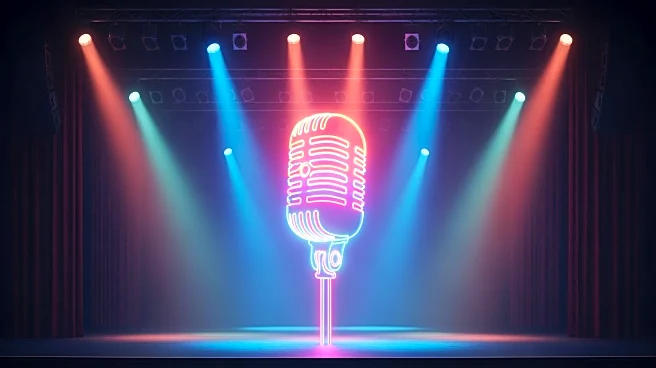What's Happening?
Chicago is home to a vibrant live music scene, with a variety of venues offering unique experiences for concert-goers. The city's music landscape has evolved significantly since the start of the 21st century, with many iconic venues closing and new ones
opening. Notable venues such as the Chicago Theatre, Constellation, and the Empty Bottle provide diverse atmospheres and musical offerings. The Chicago Theatre, owned by Madison Square Garden Entertainment, is renowned for its ornate design and acoustics. Constellation, launched by drummer Mike Reed, focuses on progressive music and local talent. The Empty Bottle, a dive bar with a rich history, offers an intimate setting for live performances. Other venues like Green Mill, Metro, and Maurer Concert Hall at Old Town School of Folk Music contribute to the city's rich musical tapestry, each with its own distinct charm and history.
Why It's Important?
The diversity and quality of Chicago's music venues play a crucial role in maintaining the city's status as a major hub for live music. These venues not only support local artists but also attract national and international acts, contributing to the city's cultural and economic vitality. The presence of such venues fosters a competitive environment that encourages innovation and creativity within the music industry. Additionally, they provide spaces for community engagement and cultural exchange, enhancing the city's appeal to tourists and residents alike. The evolution of these venues reflects broader trends in the music industry, including shifts in audience preferences and the impact of technology on live performances.
What's Next?
As Chicago's music scene continues to evolve, venues are likely to adapt to changing audience demands and technological advancements. The potential expansion of the Salt Shed, with plans for a new outdoor venue, indicates ongoing investment in the city's live music infrastructure. This expansion could further enhance Chicago's reputation as a premier destination for music lovers. Additionally, the closure of venues like the Promontory highlights the challenges faced by live music establishments, including financial pressures and changing consumer habits. The future of Chicago's music scene will depend on the ability of venues to innovate and remain relevant in a competitive market.
Beyond the Headlines
The transformation of Chicago's music venues also raises questions about urban development and cultural preservation. As new venues emerge and old ones close, the city must balance modernization with the preservation of its musical heritage. The role of venues in community building and cultural identity is significant, offering spaces for diverse musical expressions and social interactions. The ongoing changes in the music scene may also influence broader cultural trends, impacting how music is consumed and appreciated in urban environments.















